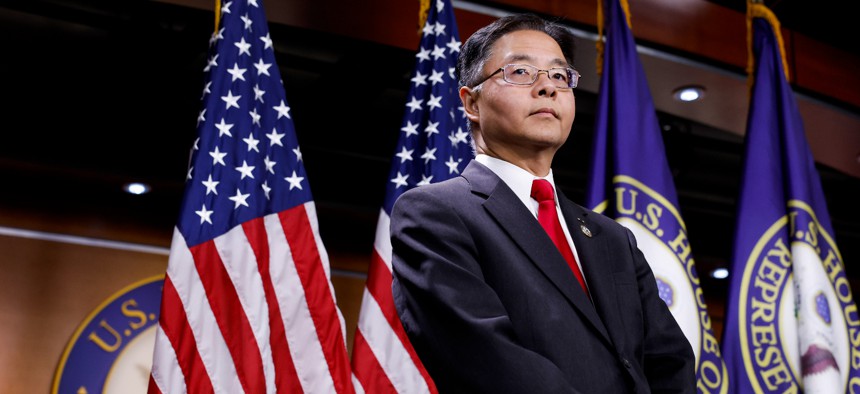Can AI boost health care delivery?

Rep. Ted Lieu (D-CA) listens at a news conference after a meeting with the caucus at the U.S. Capitol Building on September 19, 2023 in Washington, DC. Anna Moneymaker/Getty Images
Rep. Ted Lieu thinks so, with the right oversight by humans — and government.
Rep. Ted Lieu is one of the leading lights in Congress on artificial intelligence issues. He introduced a bill authored by a generative AI application and last spring co-authored an article in the New England Journal of Medicine outlining a regulatory and quality-control framework for introducing generative AI into patient care. Nextgov/FCW caught up with the California Democrat for a conversation about future plans for oversight of AI in health care.
This conversation has been edited for length and clarity.
Nextgov/FCW: What’s your take on the risks of introducing generative AI functionality into patient care?
Lieu: Generative AI can absolutely improve health care delivery in a patient care setting. But it's important that there's a human being that double-checks that content generated by the AI because AI is not designed to seek the truth. AI can make health care providers more efficient, but ultimately you're going to need a human being to make sure that the content coming out of generative AI is accurate and true.
Nextgov/FCW: In tech, especially consumer tech, we've seen developers release innovative products and worry about the consequences after the fact. Are you concerned about that business model being applied to patient care?
Lieu: I am concerned — if there's not adequate supervision. Because in medical care, if you make a mistake it could have some serious consequences. With generative AI we're still at the early stages, and the models that are currently in existence are not entirely accurate. You can't have a situation where, let's say, a document has either the wrong name of a drug or the wrong dosage or something else that could harm a patient.
Nextgov/FCW: In your article, you looked at the roles and responsibilities in government. What are you, in Congress, looking to do on this front?
Lieu: We're working on legislation to have the [National Institutes of Health] provide grants and funding, not just for new discoveries and medicine but also [to address] how do we deliver care to patients using generative AI and do it accurately. And we're also going to work on letters to [the Centers for Medicare and Medicaid Services] to have them look at putting in incentives to help doctors look at ways to use AI to help their offices.
Nextgov/FCW: As someone with a technology background, how do you envision the benefits of AI technologies in terms of public health?
Lieu: AI is very good at looking at patterns and discerning different threads from those patterns. So it would be super helpful in looking at a bunch of different facts from all over the U.S. or the world and figuring out if there is some sort of pandemic that's emerging or or some other health problem. In terms of medical discoveries, AI has already folded every single human protein known to humankind, and researchers now have that, so I think you're going to start seeing some new medical discoveries.
It's going to be super helpful to medicine. But you do need human supervision of the AI because, again, it's not entirely accurate right now.






